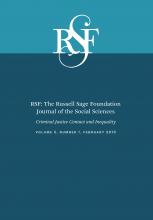Abstract
Monetary sanctions mandated in state statutes include fines, fees, restitution, and other legal costs imposed on persons convicted of crimes and other legal violations. Drawing on content analysis of current legislative statutes in Illinois pertaining to monetary sanctions, we ask three questions: What are defendants expected to pay for and why? What accommodations exist for defendants’ poverty? What are the consequences for nonpayment? We find that neoliberal logics of personal responsibility and carceral expansion suffuse these laws, establishing a basis for transferring public costs onto criminal defendants, offering little relief for poverty, and supporting severe additional penalties for unpaid debt. Statutory inequality legally authorizes further impoverishment of the poor, thereby increasing inequality. Major related organizing and advocacy work, however, has created an opening for significant changes toward greater fairness.
- © 2019 Russell Sage Foundation. Friedman, Brittany, and Mary Pattillo. 2019. “Statutory Inequality: The Logics of Monetary Sanctions in State Law.” RSF: The Russell Sage Foundation Journal of the Social Sciences 5(1): 173–96. DOI: 10.7758/RSF.2019.5.1.08. This research was funded by a grant to the University of Washington from the Laura and John Arnold Foundation (Alexes Harris, PI). We thank the faculty and graduate student collaborators of the Multi-State Study of Monetary Sanctions for their intellectual contributions to the project. We thank the editors of and contributors to this RSF volume for their feedback. Direct correspondence to: Mary Pattillo at m-pattillo{at}northwestern.edu, Northwestern University, 1810 Chicago Ave., Evanston, IL 60208.
Open Access Policy: RSF: The Russell Sage Foundation Journal of the Social Sciences is an open access journal. This article is published under a Creative Commons Attribution-NonCommercial-NoDerivs 3.0 Unported License.






